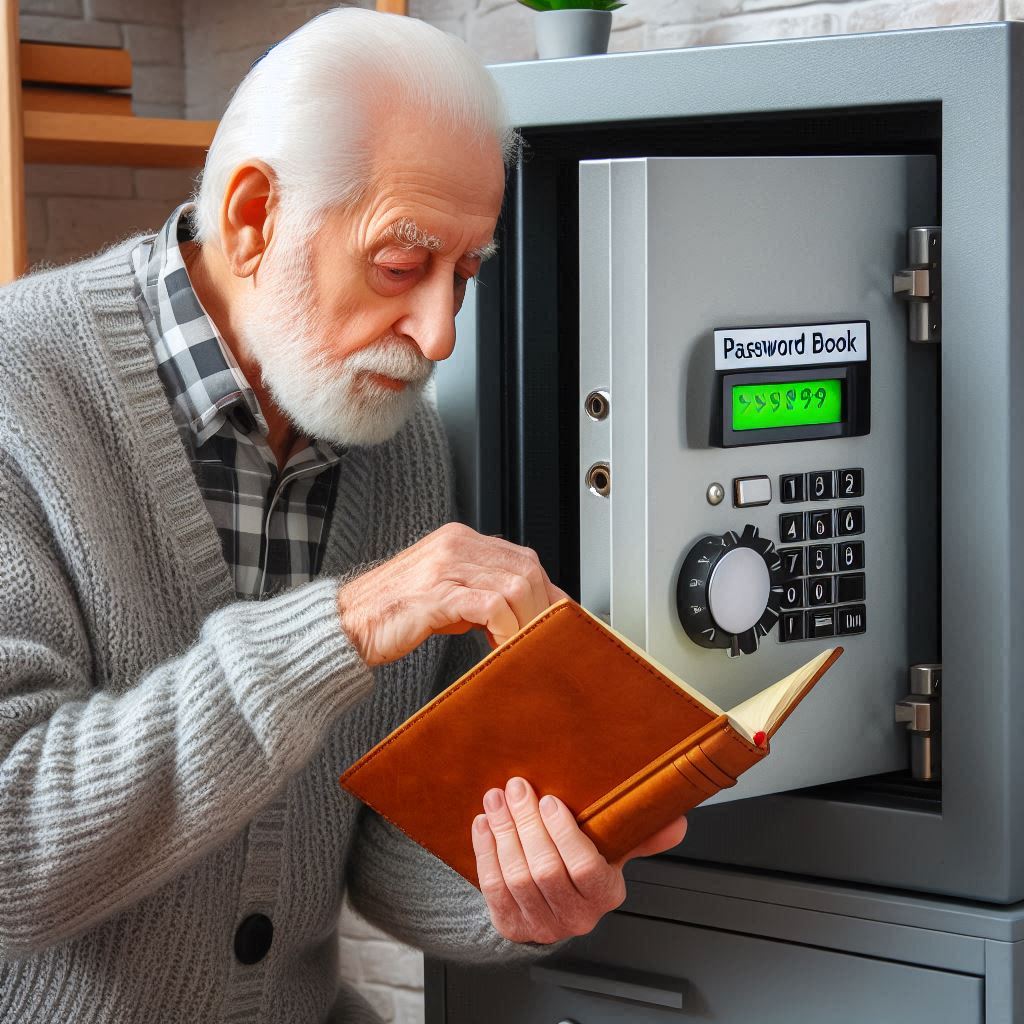
What Is Password Storage?
Password storage essentially means securely keeping your passwords to ensure you can easily access your online accounts without exposing them to security risks. Imagine it as a digital keychain that holds all your keys to various doors in the online world. Just like you wouldn’t leave your keys lying around, you need to ensure your passwords are stored safely, too.
Numerous Passwords Needed
In today’s digital age, there’s an increasing need to maintain multiple online accounts, from banking and shopping to social media and email. Each account requires a password, creating a challenge for many seniors who may not be as familiar with the constantly evolving tech landscape. You’ve probably been there, staring at a password prompt, unsure if it’s right or even what it should be.
Why is This Important?
Why is this important? Well, think of passwords as the first line of defense against unauthorized access to your private information. Storing these passwords securely is crucial, especially since there’s a lot at stake—from your personal identity to your financial details. Without proper storage, you might be vulnerable to hackers or simply lose access to important services. So, understanding how to store them safely gives you a lot more control and reduces worry about digital threats.
The Importance of Secure Password Management
Secure password management is like locking up your most prized possessions before leaving the house. It’s all about keeping your personal and financial information safe from prying eyes, whether it’s preventing unauthorized transactions on your bank account or keeping personal emails private.
Would You Leave Your Front Door Open?
Weak passwords are much like leaving the front door wide open. Unfortunately, this can lead to situations where your sensitive information gets into the wrong hands. I’ve seen how such scenarios unfold, and it’s not pleasant, especially for seniors who aren’t familiar with recovering hacked accounts.
Your First Line Of Defense
Passwords are your first line of defense online. They safeguard everything from family photos on social media to your retirement funds in an online bank account. Protecting these virtual keys is crucial, as they control access to what matters most to you.
Peace of Mind
Caring for your passwords isn’t just a technical chore. It’s a way to ensure peace of mind, knowing your personal and financial activities are secure. With everything moving towards digital platforms, having a robust password management system in place is more important than ever. It keeps you safe from possible online threats, so you’re free to enjoy what the digital world has to offer without worries.
Exploring Online Password Storage Options
Online password managers are like a personal assistant for your passwords, safely storing them so you don’t have to remember every single one. They work by keeping your passwords in a secure digital vault, helping you log in effortlessly while making sure those passwords are safe from cyber crooks.
Convenience
The main benefit of using an online password manager is convenience. Once you’ve set it up, you can keep all your passwords in a single, safe place, accessible from any device connected to the internet. This simplicity is great, especially if you maintain multiple accounts.
Always A Flip Side
But, there’s always a flip side. While these tools offer high security and convenience, putting all your password eggs in one basket means you have to trust the service provider completely. Make sure to choose a reputable manager with strong encryption and good reviews to minimize risk.
Try One Out
If you’re ready to try one out, here’s a simple guide for seniors. Start by researching popular options like Bitwarden or LastPass, which are known for their reliability. Look for essential features like multi-factor authentication, an easy-to-use interface, and customer support. If you use an antivirus software like Norton or Bitdefender, they have one with your paid subscription.
Never Store In Your Browser!!!
Two things to keep in mind here. The first is that letting your browser (like Google Chrome or Microsft Edge) remember your passwords while is convenient it’s not a good idea. The second is while password managers are fairly secure, it is cloud-based and anything cloud-based has the potential to be hacked into.
Now It’s Time To Set It Up
After choosing a password manager, set up an account and install it on your devices. It’ll prompt you to create a master password—this should be strong but something you can remember easily, as it’ll unlock all your stored passwords.
Makes it Easy
Using a password manager can dramatically change how you handle online security. It allows you to enjoy digital experiences without the burden of memorizing different, complex passwords. Many seniors find it liberating to let technology handle this part of their online life.
Keeping Passwords Safe Offline: Traditional Meets Technology
When it comes to offline password storage, the options range from writing your passwords down in a notebook to storing them on a secure thumb drive. Each method has its pros and cons, depending on how comfortable you are with technology.
Pen & Paper
Using pen and paper may seem outdated, but it’s a straightforward method that works well if you store the notebook safely. The upside? No need to worry about hackers breaching your paper password file. Just make sure to keep it in a secure place, like a lockbox or a safe. This doesn’t work for me as I have terrible penmanship and wouldn’t be able to read my own writing…lol.
Password Books
You can buy books that are set up to hold passwords just like the old address books were set up for addresses. I considered this option. The problem with this option for me is that both myself and my wife have terrible penmanship. We can’t read our own writing…lol. We also considered buying a label maker and sticking the labels to the individual pages. If you have good penmanship or like making labels this option would work fine.
The Tech Side
On the tech side, storing passwords on a secure USB drive or device that doesn’t connect to the internet can be effective. It combines the safety of being offline with the convenience of carrying your passwords with you. Just remember to keep a backup copy somewhere safe in case of device loss or failure.
Avoid Easy Passwords
A crucial tip for managing offline storage is to use a strong, yet memorable master password that controls access to your list of passwords. Avoid simple combinations like “password123” or personal information that’s easy to guess. A passphrase with a mix of words and numbers often works best.
How Do I Do It?
I use a combination of the old-fashioned book method and the techy flash drive method. I use an off-line Excel spreadsheet saved to 2 different external drives stored in separate locations. I also print out a hard copy of the spreadsheet and keep it in my safe when I am not home. When I am actively using the computer, I use the paper copy to add and or update passwords throughout the month. Then once a month I update the drives and print out a new sheet. The old one is shredded.
Store Passwords Offline
Storing passwords offline ensures that you have complete control without relying on online services. It gives many seniors peace of mind, combining traditional ways with a bit of tech-savvy. Whatever method you choose, make sure it matches your comfort level with technology and secures your passwords effectively.
Best Practices for Password Creation and Retention
Crafting strong passwords is crucial for securing your digital spaces. Aim for a password that’s long and unique, steering clear of obvious choices like “123456” or “qwerty”. Mix up letters, numbers, and symbols for complexity.
What About A Passphrase?
If remembering complex passwords feels overwhelming, try creating a passphrase—an unusual combination of unrelated words or a short sentence that’s easy for you to recall. For example, something like “SunflowerCinema!42” combines words and numbers in a memorable way.
Update Regularly
Regularly updating passwords can significantly enhance security. Think of it like changing the locks on your door after misplaced keys. Try setting a reminder every few months to review and update your passwords.
Never Use The Same Password Twice
Each account should have its own password. Using the same password across multiple sites is a bit like unlocking several doors with the same key. If one account gets compromised, others could easily follow suit.
MFA’s Offer Extra Security
Multi-factor authentication (MFA) offers an extra security layer beyond just your password. It might involve a text message code or an authentication app on your phone, which ensures that even if someone guesses your password, they can’t access your account without this additional step.
Protecting Your Accounts
Incorporating these practices doesn’t just protect your accounts; it empowers you with confidence in how you engage with the digital world. Knowing that your personal info is safe lets you explore the online space with ease.
Final Thoughts: Empowering Seniors to Secure Their Digital Lives
Securing your online presence through effective password storage is more than just a technical task—it’s about taking control of your digital life. Following the right practices makes a difference, ensuring that you have smooth and safe online experiences.
Protect What’s Important
All the methods and tools discussed—from traditional notebooks to advanced password managers—serve the purpose of protecting what’s important. For seniors, embracing these can be a significant step towards feeling confident and secure while navigating the digital world.
Final Thoughts
Remember, it’s okay to ask for help if you find yourself stuck. Reach out to family, friends, or tech-savvy folks who can guide you. Often, they can offer straightforward solutions or help set up the systems that work best for you. Don’t forget, if you have an antivirus program, it may include a password manager. Never store passwords in your browser. While convenient, it’s extremely unsafe.
As you implement these strategies, you’ll not only shield your sensitive information but also build the skills needed to adapt to new tech challenges. Empowering yourself this way is the key to enjoying everything the internet has to offer without worries.
Did you enjoy this post? Do you want to know when the next post comes out? Consider subscribing. I only send update emails once a week, usually on Friday. Try it out. You can unsubscribe at any time.
